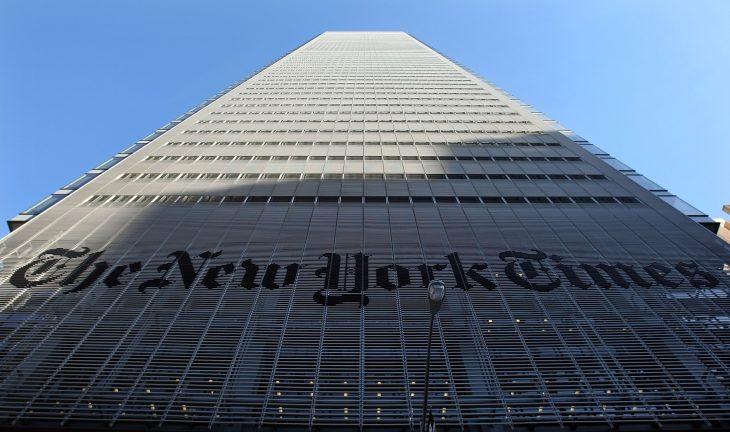Back when his country was controlled by the USSR, the Czech writer Milan Kundera pointed out that ‘Union of Soviet Socialist Republics’ was ‘four words, four lies’. It’s a strike rate that even the current US president has yet to match. Nonetheless, at one stage in Reporting Trump’s First Year: The Fourth Estate (BBC2, Sunday) we did see him pull off an impressive three-sentences, three-lies sequence in a speech about — inevitably — the mainstream media, including the New York Times. ‘They have no “sources”,’ said Trump baldly. ‘They just make ’em up. They are the enemy of the people.’
Not that Trump will care, but by then we already knew how scrupulously the paper in question goes about its reporting. The New York Times has given the makers of this new documentary series remarkable access to what goes on behind the scenes — which is to say a lot of careful fact-checking and a refusal to publish any story that can’t be fully backed up. (Rather disappointingly, of course, the actual process of publishing no longer involves the thunderous rolling of presses, but clicking on a computer icon labelled ‘publish’.)
In the first episode, the Times did eventually find the sources required to score some serious scoops. The overwhelming impression, though, was of clever, slightly earnest newspaper types struggling to understand the new world in which they found themselves: a world where the traditional rules have gone and there’s a president who, as one reporter put it, ‘is very comfortable not telling the truth’.
In the circumstances, sad to say, the executive editor’s continued commitment to ‘independent honest inquiry’ sounded almost quaint, although not as much as the publisher’s proud declaration that, ‘We’re not driven by clicks, we think in decades’. Quaintest of all, these people occasionally even displayed that least fashionable of virtues: self-doubt. ‘We didn’t have our finger on the pulse of the country,’ said one about the paper’s election coverage, ‘and that was wrong.’
Appropriately enough, the programme is pretty old-school itself, determined not to sensationalise, and content to move quite slowly, with plenty of lingering shots of people looking pensive in glass-fronted offices. Even so, the result provides unnerving evidence of what happens when moral nuance becomes a source of suspicion rather than of admiration. (Nowadays, the Times also comes under attack from the left if it fails to condemn every aspect of the Trump administration’s behaviour.) Happily, while the newspaper’s staff spent most of the time looking somewhere between infuriated and shell-shocked, they did remain journalists to the core — greeting each fresh Trump outrage with both dismay and a regular excited cry of ‘What a fucking story!’
Still, for anybody who does value such old-fashioned values as balance, Monday night brought us a full-on Trump supporter. Inside the American Embassy (Channel 4) is another new documentary series with unusually close access to its subject — in this case, Robert Wood Johnson, billionaire businessman, owner of the New York Jets and, since November 2017, the US ambassador to Britain.
Johnson’s appointment was presumably linked to the large donations he made to Trump’s presidential campaign — and at one point we heard him boast that he’s raising his two young sons to be ‘just like Donald Trump’. But his devotion was by no means slavish. Clearly, he’d have preferred it if the President hadn’t retweeted videos from the far-right group Britain First — and, ideally, had also refrained from criticising the cost and location of the new American embassy. Nor was he entirely won over when, following his recognition of Jerusalem as the Israeli capital, Trump urged everybody in the region to stay calm. (‘That does it every time,’ Johnson observed with somewhat weary amusement.)
In the absence of any diplomatic experience, Johnson is relying, with unshakeable self-assurance, on his business skills to see him through. During a trip to the state department in Washington, an earnest under secretary wondered how the department could help ‘from a cultural standpoint — arts, photography, exchange programmes’. ‘We like music and all that,’ Johnson replied long-sufferingly. ‘But what pays for it is the business guys.’ Back in London, he visibly alarmed Sir Alan Duncan with a hymn of praise to the peregrine falcon, ‘the ultimate in domination’, with its ability to cut a pigeon’s throat in midair.
Johnson applied the same gung-ho approach to Brexit, something he regards as ‘not a major challenge’. (‘How can you have this great a country and not be successful?’) Unfortunately, his bullishness went distinctly unshared by most of the Brits he met. Alan Duncan, for example, responded to Johnson’s confidence in a rosy British future with a comedy crossing of the fingers. And as a general rule, the more the ambassador urged this country’s business leaders not to be so nervous about the prospect, the more nervous they looked.






Comments